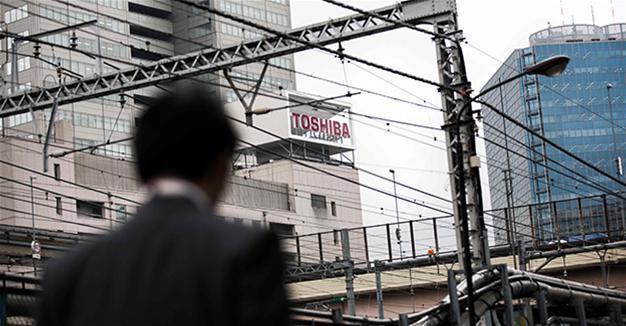Toshiba flags ‘billions of dollars’ loss on US nuclear acquisition
TOKYO - Reuters

AFP photo
Toshiba Corp said it may have to book several billion dollars in losses related to a U.S. nuclear power acquisition, a shock warning that sent its stock tumbling 12 percent and rekindled concerns about its accounting acumen.The Japanese group said cost overruns at U.S. power projects handled by a nuclear construction business newly acquired from Chicago Bridge & Iron (CB&I) would be much greater than initially expected, potentially requiring a huge write-down.
Big losses would be another slap in the face for a sprawling conglomerate hoping to recover from a $1.3 billion accounting scandal as well as a write-down of more than $2 billion for its nuclear business in the last financial year.
Tom O’Sullivan, a former investment banker and founder of energy consultancy Mathyos Japan, noted the acquisition coincided with the finalizing of a record fine by Japanese regulators for accounting irregularities at Toshiba.
“This indicates that corporate governance controls at one of Japan’s largest and most consequential companies may have been extremely weak,” he said, adding the developments may further undermine confidence in Toshiba and significantly weaken its international nuclear credentials.
Clashing over who should shoulder potential liabilities related to cost overruns and over calculations for working capital for the unit, CB&I sued Toshiba’s Westinghouse division after Westinghouse said it was owed more than $2 billion.
Shares in Toshiba, which remains on the Tokyo bourse’s watchlist due to concerns about the firms’ internal controls, finished 12 percent lower after the company flagged the announcement earlier in the day.
Toshiba, led by new CEO Satoshi Tsunakawa, has positioned its nuclear and semiconductors businesses as key pillars of growth while seeking to scale down less profitable consumer electronics units such as personal computers and TVs.
It has forecast a full-year net profit of about 145 billion yen this financial year, a turnaround from a loss of 460 billion yen, thanks to strong demand for flash memory chips from Chinese smartphone makers.
But any big losses are likely to force Toshiba to boost a capital base that has been weakened by range of restructuring steps taken in the wake of the accounting scandal.
As of the end of September, Toshiba had shareholders’ equity of 363 billion yen, or just 7.5 percent of assets, which could fall close to zero if the company is forced to log significant losses.
Tsunakawa, who took the helm in June, has pledged to rebuild trust in the firm and has said he would prioritize beefing up Toshiba’s capital base.
Masahiko Ishino, an analyst at Tokai Tokyo Research Center, said the focus may soon shift to whether Toshiba will divest some of its businesses if the latest loss wipes out its shareholders’ equity.
“There will be a lot of companies that want to buy Toshiba’s businesses,” Ishino said. “It is possible that its NAND flash memory business would attract various buyout offers as there are few players in the market,” he said.
















